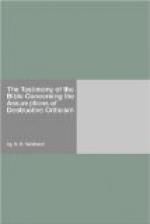Hosea adds his testimony to that of Amos and Ezekiel. Again and again he refers to the law of sacrifices as taught in Leviticus. “They shall be ashamed because of their sacrifices.” “They sacrifice on the tops of the mountains and burn incense upon the hills.” (Hosea iv. 13, 19.)
Concerning Ephraim, God says by the prophet Hosea: “I wrote for him ten thousand things of my law.” (Hosea viii. 12, R.V.) He refers to the law as given to Moses in all its length and breadth.
The critics demand large credulity from us. They ask us to accept their position that the Bible itself was mistaken as to its authorship, that Christ and his apostles were mistaken; or at least did not tell the truth when they assigned the Pentateuch (Leviticus included) to Moses. They then ask us to believe that the Bible is not only unimpaired by the mistakes which the experts claim to have discovered, but is really much improved by the discovery!
It passes rational comprehension that we are permitted to expunge from the Word of God, on the ground of literary criticism, the positive and repeated statements of inspired men, and of the Son of God, and yet assume that we have an unimpaired revelation!
We rather turn to the glorious array of witnesses to the integrity of the Bible that God has furnished—the book itself, Moses and the prophets, all the New Testament writers and the “Teacher sent from God.” From these witnesses we rest in the unshaken belief that “God spake all these words” (Ex. xx. 1) and that “Moses wrote all the words of the Lord” (Ex. xxiv. 4), including Leviticus.
VI. ASSUMPTIONS CONCERNING THE BOOK OF ISAIAH.
"Behold, I am the Lord, the God of all flesh; is there anything too hard for me?” Jer. xxxii. 27.
"God hath spoken once; twice have I heard this; that power belongeth unto God.” Psa. lxii. 11.
"Great is our Lord, and of great power; his understanding is infinite.” Psa. cxlvii. 5.
"He revealeth the deep and secret things; he knoweth what is in the darkness, and that the light dwelleth with him.” Dan. ii. 2.
"Known unto God are all his works from the beginning of the world” Acts xv. 18.
"The Lord looketh from heaven; he beholdeth all the sons of men.” Psa. xxxiii. 13.
"Now therefore go, and I will be with thy mouth, and teach thee what thou shalt say.” Ex. iv. 12.
"And he said, Go, and tell this people, Hear ye indeed, but understand not; and see ye indeed, but perceive not.” Isaiah vi. 9.
The critics claim to have discovered, on literary and other evidence, that the Church of Christ, in all its branches, has been mistaken in all the past concerning the author of the book known as the Prophecies of Isaiah. They assume that all the foremost scholars of the world, and the faith of God’s people, have been misled. Our critical advisers profess to have discovered that there were at least two, and probably many more prophets, whose writings compose the book. They refuse to recognize Isaiah alone as the author; and for several reasons:




